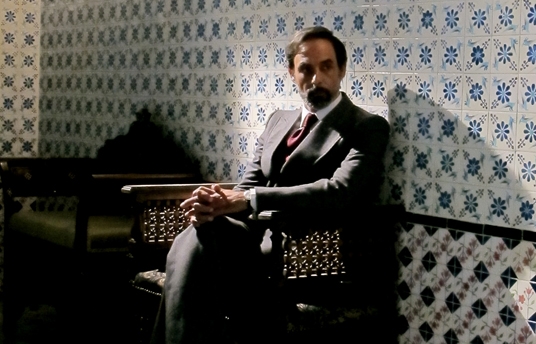Love in Middle Eastern Cinema
Feb 06, 2013

From the film 'Professor'
The boundaries of love are limitless as people have become enamored with themselves, inanimate objects, and even digital pets hailing from japan. Although, love comes in many shapes and sizes it is ultimately influenced by the society in which it is contained. The beauty of love is that it can sometimes transcend these limitations and when recorded through film or literature it can be relevant for hundreds of years. Representations of love in Middle Eastern cinema are very dynamic, yet they are still influenced and shaped by different societies and cultural values.
Love stories within the Middle East are often created as a reflection of the society in which the characters are contained—and these locales often have some sort of over-bearing authority figure. Love under or outside the rule of authority is a prevalent theme and can be seen in Rambod Java’s ‘No Entry for Men’. The film explores the lives of young women in one of the strictest all girls’ school in Tehran and their attempts to inquire about the meaning of love from their jaded headmistress, Mrs Darabi. While discussing one of humankind’s most influential emotions, Mrs Darabi states that real love is only between a mother and her child, everything else is virtual love, which is caused by a hormonal imbalance.
video#1
Within the film the idea of love is defined by an older, supposedly wiser authority instead of those who are experiencing the emotion for the first time. This humorous dialogue continues until one of the characters asks ‘What about Romeo and Juliet?’, the headmistress replies by saying ‘that kind of love only exists in stories’. This provides a perfect example of love being shaped within a given system or society, to the extent that one of the greatest works of literature and love stories can be dismissed. This scene was indeed humorous, but it does reflect an on-going theme of love shaped by external factors such as tradition and society.
In terms of a social construct, romantic love in the Middle East often doesn’t exist outside marriage. It is very surprising to see so many films tackling this subject and capturing a unique perspective of love forged through rebellion. Halkawt Mustafa’ s film ‘Red Heart’ shows the perspective of a young couple who attempt to adhere to tradition and get married, however the characters Shirin and Soran are denied their request because of the religious values of Soran’s family. Much like the Capulets and Montagues, Shirin and Soran defy all odds and run away together against the wishes of their families and the greater society in which they live. Films such as Susan Youssef’s ‘Habibi Rasak Kharban’, Mahmoud Ben Mahmoud’s ‘Professor’ and Hesham Issawi’s ‘Cairo Exit’ also create a narrative of rebellion, one which defies society and tradition in the name of love.
video#2
Global filmmaking also reflects some of the trends in Middle Eastern Cinema; however it seems to be less reflective of the need to rebel against a given society for love. International films from some areas outside the Middle East do not have to adhere to as many cultural and religious restrictions, allowing them to further investigate taboo subject matter. In the western world the authority and influence of the family unit has been greatly dissolved, while in the Middle East adherence to cultural and family values is still a predominate part of the society—thus it is reflected in the filmmaking. Although, both types of filmmaking have their similarities and differences, films in the Middle East seem to have a stronger need to push against the influence of society in order to obtain what is desired, the impetus of which is that these are struggles people face in everyday life. Perspectives of love are not just segregated to this area, rather films such as Fatma Zohra Zamoum’s ‘How Big Is Your Love’, Majid Majidi’s ‘Children of Heaven’ and Hany Abu-Assad’s ‘Paradise Now’ present an unconventional perspective of love; one which is a unique reflection of characters, whether they are young children searching for a special pair of shoes or a suicide bomber who saves his best friends life.
video#3
The association of rebellion and love is prevalent within the Middle East as if reflects the real-life influences of society and tradition, while also creating an internationally accessible form of storytelling. Although, restrictions within many societies throughout the Middle East will make these types of narratives more prevalent, it is ultimately the universality of subject matter that shines through. The creation of Greek myths like Orpheus and Eurydice and works of literature such as Shakespeare’s Romeo and Juliet and Dante’s Inferno, have captivated audiences with the idea of forbidden love and the distances people will journey to obtain it.
Ultimately, it is the mix of cultural relevance and universality of the subject matter that make Middle Eastern films about love so unique. If you are looking for compelling films from Middle Eastern cinema then checkout some of the film titles provided as they will hopefully warm your heart.